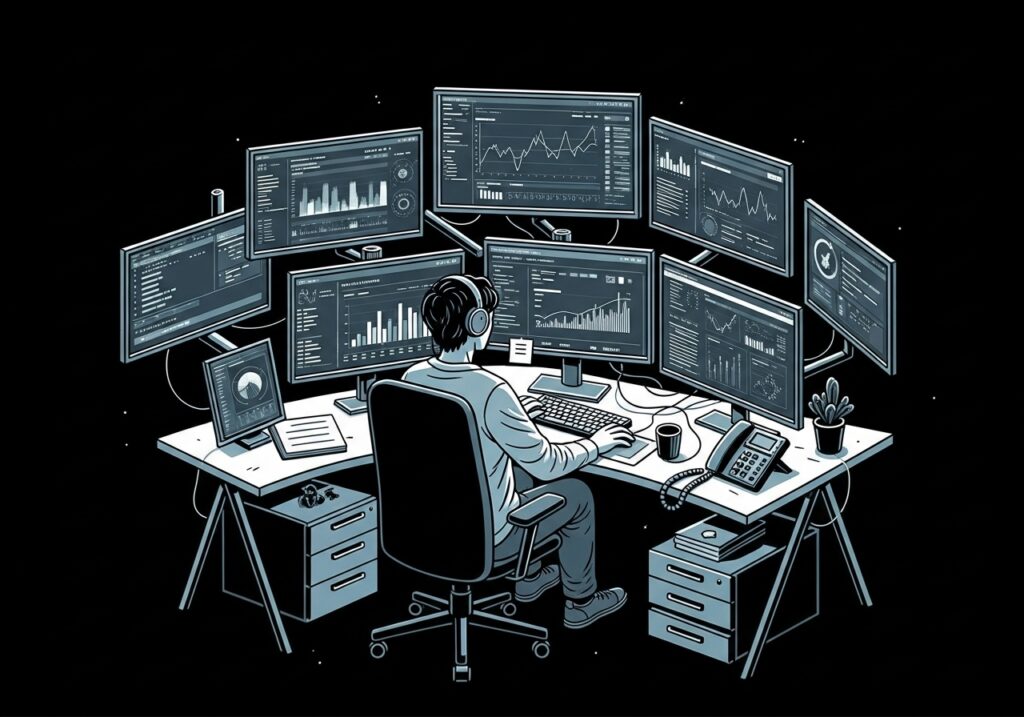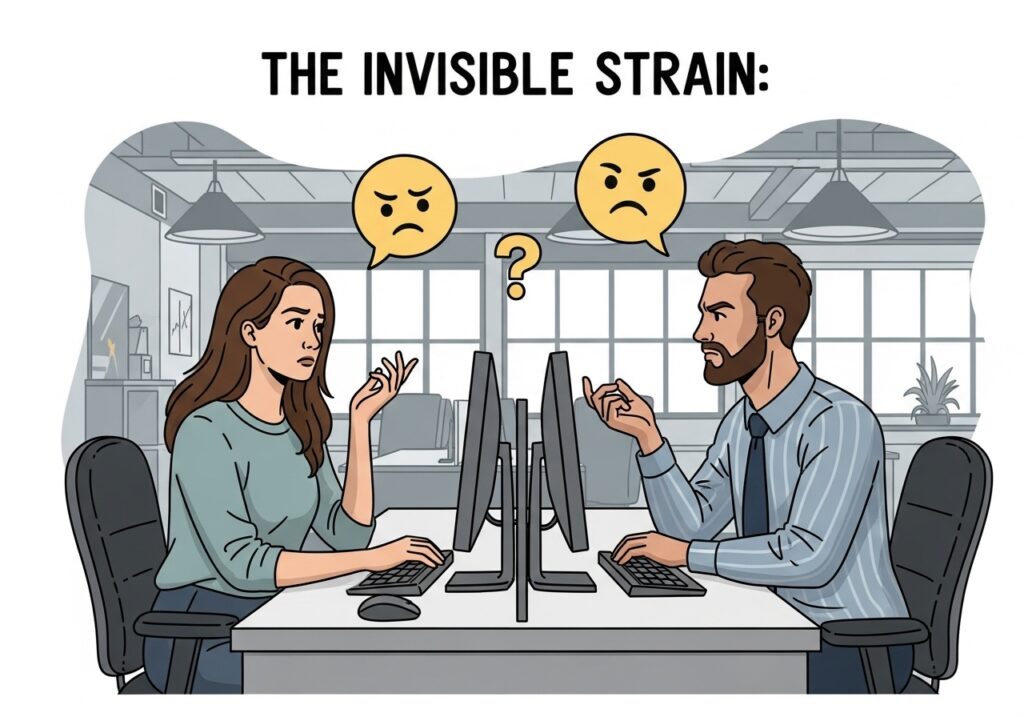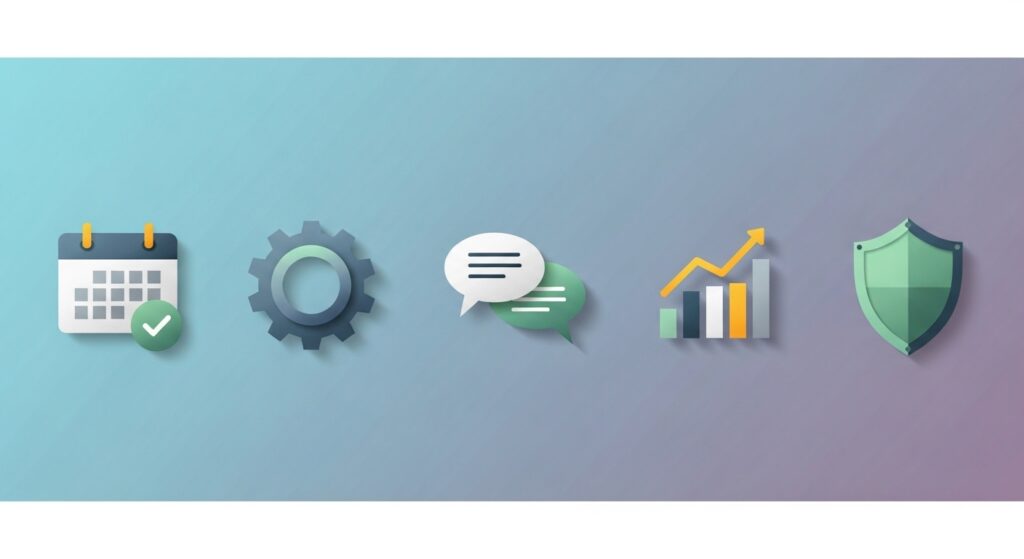Key Takeaways
- Burnout is More Than Just Stress: Marketing burnout is a specific syndrome characterized by emotional exhaustion, cynicism, and reduced professional efficacy, differing significantly from everyday work stress. Ignoring it can have severe long-term consequences on your career and well-being.
- Seven Critical Warning Signs: Watch for chronic fatigue, decreased job satisfaction, reduced productivity, increased irritability, cognitive impairment, physical symptoms, and feelings of detachment. Recognizing these
marketing burnout signsearly is crucial for intervention. - Marketers Are Highly Vulnerable: The fast-paced, always-on, data-driven nature of the marketing industry, coupled with constant pressure for results and evolving technologies, makes professionals particularly susceptible to
marketing stressanddigital marketing burnout. - Proactive Prevention is Key:
Prevent marketing burnoutby setting boundaries, prioritizing self-care, developing coping mechanisms, and advocating for supportive workplace environments. Both individuals and organizations play a vital role in fosteringmarketing mental health. - Action Steps for Recovery & Resilience: If you recognize these signs, it’s essential to take concrete steps such as re-evaluating workload, seeking support, taking breaks, and focusing on what truly re-energizes you. Prioritizing your well-being isn’t a luxury; it’s a necessity for sustained career success and personal happiness.
The digital marketing landscape is a dynamic, exhilarating, and often relentless arena. From optimizing SEO algorithms to crafting viral social media campaigns, launching targeted ads, and analyzing reams of data, marketers are constantly on the go, juggling multiple projects with tight deadlines and ever-shifting priorities. This high-octane environment, while exciting, often comes with a hidden cost: marketing burnout.
You started in marketing with a spark – a passion for creativity, a love for connection, a drive to tell compelling stories. But lately, that spark might feel more like a flicker, or even extinguished altogether. You’re dragging yourself to your desk, the thought of another campaign brief fills you with dread, and the once-thrilling challenge of a new platform now feels like an insurmountable obstacle. If this resonates, you’re not alone. Burnout in marketing is a growing concern, impacting individuals at all levels, from entry-level coordinators to seasoned CMOs.
This isn’t just about feeling “stressed out” after a busy week. Marketing burnout is a distinct psychological syndrome characterized by emotional exhaustion, cynicism, and a reduced sense of personal accomplishment. It erodes your passion, compromises your health, and ultimately stifles your potential. Recognizing the marketing burnout signs early is not a weakness; it’s a critical act of self-preservation and a strategic move for long-term career sustainability.
In this extensive guide, we’ll dive deep into the specific pressures that make marketers uniquely susceptible to burnout. More importantly, we’ll equip you with the knowledge to identify the seven unmistakable signs that you might be heading down this perilous path. We’ll explore what these signs look like in the day-to-day grind, how they manifest, and why they’re more than just temporary fatigue. Finally, we’ll discuss proactive strategies to prevent marketing burnout and foster a healthier, more sustainable career in this rewarding field.
The Relentless March of Modern Marketing: Why Are Marketers So Vulnerable?
Before we delve into the signs, it’s crucial to understand why the marketing profession, particularly digital marketing, is a fertile ground for burnout. The very nature of the job places unique demands on mental and emotional resources.
The “Always-On” Culture
The internet never sleeps, and neither, it often feels, do marketers. Social media trends emerge and vanish in a blink, news cycles demand instant responses, and global campaigns mean colleagues in different time zones are always active. This creates an expectation of constant availability and responsiveness, blurring the lines between work and personal life. The result? A perpetual state of low-grade marketing stress that can quickly escalate.
Data Overload and Performance Pressure
Modern marketing is incredibly data-driven. While this offers unprecedented insights, it also means marketers are under constant scrutiny, with every campaign, every click, and every conversion meticulously tracked and analyzed. The pressure to hit KPIs, justify ROI, and continuously demonstrate tangible results can be immense, leading to a fear of failure and a relentless drive for perfection.
Rapid Technological Evolution
The tools, platforms, and strategies in marketing evolve at an astonishing pace. What was cutting-edge last year might be obsolete today. Marketers are expected to be perpetual learners, constantly upskilling and adapting to new technologies – from AI-powered analytics to emerging social platforms. This constant learning curve, while exciting, can also be exhausting and contribute significantly to digital marketing burnout.
Creative Demands vs. Repetitive Tasks
Marketing often requires immense creativity – brainstorming innovative campaigns, crafting compelling copy, and designing engaging visuals. However, it also involves a significant amount of repetitive, detail-oriented tasks like data entry, reporting, and routine scheduling. The constant switching between highly creative, mentally taxing work and meticulous, sometimes monotonous tasks can be draining.
The “Hero” Complex and Unrealistic Expectations
Many marketers feel a personal responsibility for the success of campaigns, often taking on extra work and sacrificing personal time to meet ambitious goals. This “hero” complex, coupled with sometimes unrealistic expectations from leadership or clients, can lead to chronic overwork and a feeling of never quite doing enough, a hallmark of marketing job stress.

The 7 Unmistakable Signs You’re Heading for Marketing Burnout
Now that we understand the fertile ground, let’s turn our attention to the specific marketing burnout signs you need to watch for. These aren’t isolated incidents but rather a pattern of symptoms that, when combined, paint a clear picture of an encroaching problem.
1. Chronic Fatigue & Exhaustion (Beyond “Tired”)
This is arguably the most pervasive and often the first sign of burnout in marketing. It’s not just the feeling of being sleepy after a late night of campaign launches; it’s a deep-seated, persistent exhaustion that sleep doesn’t seem to cure.
What it Looks Like:
- Physical Weariness: You wake up feeling tired, even after a full night’s rest. Your body feels heavy, and everyday tasks feel like a monumental effort. You might experience persistent headaches or muscle aches.
- Mental Drowsiness: Your brain feels “foggy” or sluggish. It’s hard to concentrate, and you find yourself staring blankly at your screen, unable to start or complete tasks. Decision-making feels arduous.
- Lack of Energy for Non-Work Activities: Your once-loved hobbies or social activities now feel like too much effort. You’re constantly canceling plans because you simply don’t have the energy.
- Increased Reliance on Stimulants: You find yourself needing more coffee, energy drinks, or even sugary snacks just to get through the day, only to crash harder later.
Why it’s a Sign of Marketing Burnout:
Unlike temporary fatigue, chronic exhaustion stemming from marketing stress indicates that your body and mind are operating in a prolonged state of alert, draining your adrenal system and depleting your vital resources. This continuous activation without adequate recovery is a hallmark of burnout. When you’re constantly pushing yourself to meet deadlines, respond to client demands, and keep up with industry trends, your system never gets a chance to truly rest and recharge. This is particularly prevalent in digital marketing burnout where the boundaries between work and personal time are often blurred.
“Chronic fatigue isn’t just a physical ailment; it’s often a profound symptom of mental and emotional overload. Your body is screaming for a break that your mind isn’t allowing.” – Expert Insight
2. Decreased Job Satisfaction & Cynicism
Remember the excitement you felt when you landed your first marketing role? The thrill of seeing your campaigns go live, the satisfaction of hitting a conversion goal? When burnout sets in, that passion evaporates, replaced by indifference or even outright cynicism.
What it Looks Like:
- Loss of Enthusiasm: Projects you once found exciting now feel mundane or irritating. You dread starting new tasks, even creative ones.
- Negative Outlook: You find yourself constantly criticizing your work, your team, your clients, or the industry as a whole. You might start making negative comments about marketing, even to friends or family.
- Feeling Unappreciated: Despite your efforts, you feel undervalued or that your work doesn’t matter. You might start questioning the purpose of your job or even your career path.
- Lack of Pride: You no longer feel a sense of accomplishment from successful campaigns or positive results. It just feels like another task completed.
Why it’s a Sign of Marketing Burnout:
Cynicism and a lack of satisfaction are core components of burnout, specifically termed “depersonalization” or “detachment.” It’s a coping mechanism where you emotionally distance yourself from your work to protect yourself from the overwhelming demands and frustrations. This emotional disengagement is a dangerous marketing burnout sign because it directly impacts your motivation and the quality of your output. When you’re constantly under pressure, facing setbacks, or feeling stretched thin, this defense mechanism kicks in, leading to a general negativity that poisons your professional life.
| Characteristic | Healthy Job Satisfaction | Burnout-Induced Cynicism |
|---|---|---|
| View of Work | Challenging & Rewarding | Meaningless & Tedious |
| Team Interaction | Collaborative & Supportive | Irritating & Inefficient |
| Self-Perception | Competent & Valued | Ineffective & Overlooked |
| Future Outlook | Optimistic & Growth-Oriented | Bleak & Stagnant |
3. Reduced Productivity & Procrastination
Paradoxically, despite putting in long hours, you might find yourself accomplishing less. The very drive that made you successful starts to falter, leading to missed deadlines and a growing backlog of tasks.
What it Looks Like:
- Difficulty Initiating Tasks: You stare at your to-do list, knowing what needs to be done, but can’t bring yourself to start. You might spend excessive time planning or organizing instead of doing.
- Increased Errors: Simple mistakes become more frequent – typos in emails, errors in data, forgotten details in campaigns.
- Missed Deadlines: Despite your best intentions, you find yourself consistently behind schedule, leading to last-minute rushes and lower quality work.
- Feeling Overwhelmed: Even small tasks feel daunting, and your entire workload seems insurmountable, leading to a paralysis of inaction.
- Decreased Quality of Work: The meticulousness and creativity that once defined your work begin to wane. You settle for “good enough” rather than striving for excellence.
Why it’s a Sign of Marketing Burnout:
Reduced productivity is a direct consequence of both chronic fatigue and cognitive impairment (which we’ll discuss next). Your mental resources are depleted, making it harder to focus, solve problems, and sustain effort. Procrastination becomes a coping mechanism to delay confronting tasks that feel overwhelming or joyless. This cycle of low productivity further fuels marketing job stress and feelings of inadequacy, reinforcing the burnout spiral. The constant pressure to perform in digital marketing burnout environments often means individuals try to compensate by working more, which only exacerbates the problem when their mental batteries are already dead.
4. Increased Irritability & Interpersonal Conflicts
When you’re running on empty, your fuse shortens. What might once have been a minor annoyance can now trigger a disproportionate emotional reaction. This often spills over into your interactions with colleagues, clients, and even loved ones.
What it Looks Like:
- Short Temper: You snap at colleagues or become easily frustrated by minor inconveniences. Patience wears thin quickly.
- Increased Arguments: You find yourself getting into more disagreements, whether in person, via email, or in team meetings.
- Withdrawal from Social Interaction: You might start avoiding team lunches, coffee breaks, or social gatherings. The thought of engaging in small talk feels exhausting.
- Sensitivity to Criticism: Constructive feedback that you once welcomed now feels like a personal attack, leading to defensiveness or resentment.
- General Pessimism: Your default emotional state might lean towards negativity, making it difficult to maintain positive relationships.
Why it’s a Sign of Marketing Burnout:
Emotional exhaustion severely limits your capacity for emotional regulation. Your resilience is low, and your ability to tolerate frustration or adapt to changes is significantly diminished. This is a common marketing burnout sign because the high-pressure, collaborative nature of marketing often requires constant negotiation and teamwork. When you’re burned out, these interactions become sources of intense marketing stress, leading to friction and damaged professional relationships. This impacts not only your personal well-being but also team cohesion and overall project success. Find strategies for better team communication here.

5. Cognitive Impairment (Focus, Memory, Creativity)
The mental fog that accompanies burnout isn’t just about feeling tired; it profoundly impacts your cognitive functions, which are vital for a successful marketing career.
What it Looks Like:
- Difficulty Concentrating: You struggle to focus on tasks, often finding your mind wandering or getting easily distracted. Reading an entire report or even an email becomes a challenge.
- Memory Lapses: You forget important details, meeting times, or instructions. You might find yourself searching for words or struggling to recall information you usually know.
- Lack of Creativity: The wellspring of new ideas dries up. Brainstorming sessions feel unproductive, and you struggle to come up with fresh angles or innovative solutions. Your work feels repetitive and uninspired.
- Poor Decision-Making: You hesitate to make decisions, or you make impulsive choices that you later regret. The ability to weigh options and think strategically is compromised.
- Information Overload: You feel overwhelmed by the sheer volume of information, unable to process or prioritize it effectively, a common pitfall in
digital marketing burnout.
Why it’s a Sign of Marketing Burnout:
Your brain, like any muscle, needs rest to function optimally. Prolonged marketing stress floods your system with cortisol, which can impair memory and executive functions over time. The creative part of your brain, which thrives on relaxation and divergent thinking, becomes stifled under constant pressure. This marketing mental health impact is particularly damaging for marketers, whose roles often demand sharp analytical skills, innovative thinking, and meticulous attention to detail. When these cognitive functions decline, your professional efficacy plummets.
6. Physical Symptoms & Neglected Well-being
Burnout isn’t just a mental state; it manifests physically. Your body often sends warning signals long before your mind fully acknowledges the problem. Ignoring these can lead to serious health issues.
What it Looks Like:
- Sleep Disturbances: Despite being exhausted, you might struggle to fall asleep, stay asleep, or experience restless, non-restorative sleep.
- Frequent Headaches or Migraines: Persistent tension headaches or an increase in migraine frequency can be a sign of chronic stress.
- Digestive Issues: Stomach aches, indigestion, IBS symptoms, or changes in appetite (either overeating or undereating) are common stress-related physical manifestations.
- Weakened Immune System: You find yourself getting sick more often – persistent colds, flu, or other infections, indicating a compromised immune response.
- Neglect of Personal Care: You might skip meals, miss workouts, neglect personal hygiene, or abandon hobbies that once brought you joy. Your focus is solely on getting through the workday.
- Increased Tension: Chronic muscle tension in your neck, shoulders, and back is a common physical response to prolonged stress.
Why it’s a Sign of Marketing Burnout:
The continuous fight-or-flight response triggered by marketing stress takes a significant toll on your physiological systems. Your body is not designed for sustained high-stress levels without adequate recovery. These physical symptoms are your body’s way of signaling that something is fundamentally wrong and that your marketing mental health is impacting your physical health. Recognizing these early marketing burnout signs is crucial because prolonged physical neglect can lead to more severe chronic conditions. It’s a clear indicator that you need to actively prevent marketing burnout from progressing further.
7. Detachment & Feeling Disconnected
This sign embodies the essence of “depersonalization” in burnout. It’s a feeling of being an outsider, an observer of your own life and work, rather than an engaged participant.
What it Looks Like:
- Emotional Numbness: You feel a sense of apathy or indifference towards things that once mattered. You might feel emotionally flat or unable to experience strong emotions, whether positive or negative.
- Feeling Like a Cog in the Machine: You perceive your work as meaningless, a series of tasks with no real impact or purpose. You feel disconnected from the larger goals of your team or company.
- Withdrawal from Team and Community: You feel isolated, even when surrounded by colleagues. You might intentionally distance yourself from team activities or discussions.
- Loss of Sense of Identity: Your professional identity, once a source of pride, might feel hollow or irrelevant. You might question who you are outside of your job.
- Disengagement from Professional Development: You lose interest in industry news, conferences, or learning new skills, even if they were once exciting to you.
Why it’s a Sign of Marketing Burnout:
Detachment is a powerful coping mechanism against emotional overload. By disconnecting, you’re subconsciously trying to protect yourself from the pain of exhaustion and disillusionment. However, this disconnection also strips away your sense of purpose and belonging, which are fundamental to human well-being and job satisfaction. This is a critical marketing burnout sign because it affects your ability to connect with your audience, your team, and your own professional growth. In burnout in marketing, this feeling of being a “number” rather than a valuable contributor can be particularly corrosive.

Beyond Recognition: Proactive Steps to Prevent Marketing Burnout
Identifying the signs is the first crucial step, but it’s just the beginning. The next, and most vital, is to take action. Prevent marketing burnout isn’t a one-time fix; it’s an ongoing commitment to your well-being. This requires both individual effort and organizational support.
Individual Strategies to Foster Marketing Mental Health
As an individual marketer, you have more control than you might think over your susceptibility to burnout.
- Set Clear Boundaries:
- Define Work Hours: Establish a start and end time for your workday and stick to it. Avoid checking emails or working late into the evening.
- “No-Work” Zones: Designate certain times (e.g., evenings, weekends) and places (e.g., your bedroom) as free from work-related tasks.
- Digital Detoxes: Regularly disconnect from all work-related digital platforms. Even short breaks can be rejuvenating.
- Communicate Boundaries: Inform your team and clients about your availability to manage expectations.
- Prioritize Self-Care (Non-Negotiable):
- Adequate Sleep: Aim for 7-9 hours of quality sleep per night. Establish a relaxing bedtime routine.
- Nutritious Eating: Fuel your body with healthy foods. Avoid relying on excessive caffeine and sugar.
- Regular Exercise: Physical activity is a powerful stress reliever. Even short walks can make a difference.
- Mindfulness and Relaxation: Incorporate practices like meditation, deep breathing exercises, or yoga to calm your nervous system. Even 10 minutes a day can be beneficial.
- Hobbies and Interests: Actively pursue activities outside of work that bring you joy and a sense of accomplishment.
- Optimize Your Work Habits:
- Time Management: Use techniques like the Pomodoro Technique, time blocking, or the Eisenhower Matrix to manage your tasks effectively and reduce
marketing job stress. - Prioritization: Learn to distinguish between urgent and important tasks. Focus on high-impact activities.
- Delegate When Possible: If you have a team, leverage their strengths. Don’t feel you have to do everything yourself.
- Take Breaks: Schedule short breaks throughout your day to step away from your screen, stretch, or grab a drink of water. Lunch breaks are sacred.
- Time Management: Use techniques like the Pomodoro Technique, time blocking, or the Eisenhower Matrix to manage your tasks effectively and reduce
- Develop Coping Mechanisms:
- Seek Support: Talk to trusted friends, family, or a mentor about your feelings. Sharing your struggles can alleviate emotional burden.
- Professional Help: Don’t hesitate to consult a therapist or counselor if
marketing stressfeels overwhelming. Mental health professionals can provide effective strategies and support. - Journaling: Writing down your thoughts and feelings can be a therapeutic way to process emotions and gain perspective.
- Problem-Solving Focus: Instead of dwelling on problems, try to identify solutions or actionable steps.
- Continuous Learning, Mindfully:
- Stay updated with industry trends, but be selective. You don’t need to master every new tool overnight. Focus on areas that genuinely excite you or are crucial for your role. This can help combat
digital marketing burnoutby keeping skills fresh without overwhelming you. - Mentorship: Seek out a mentor or become one. Sharing knowledge and gaining different perspectives can be invigorating.
- Stay updated with industry trends, but be selective. You don’t need to master every new tool overnight. Focus on areas that genuinely excite you or are crucial for your role. This can help combat
Organizational Strategies to Combat Burnout in Marketing
While individual responsibility is key, organizations also have a profound impact on marketing mental health. A supportive work environment is the best defense against widespread burnout in marketing.
- Foster a Culture of Well-being:
- Lead by Example: Leaders who openly prioritize their well-being and model healthy work-life boundaries encourage their teams to do the same.
- Open Communication: Create channels for employees to openly discuss workload, stress levels, and
marketing mental healthwithout fear of retribution. - Recognize and Reward: Acknowledge employees’ efforts and successes. Feeling valued is a powerful antidote to burnout.
- Promote Breaks and Vacations: Actively encourage employees to take their allotted time off and ensure they can truly disconnect.
- Manage Workload Effectively:
- Realistic Expectations: Set achievable goals and deadlines. Avoid consistently over-committing the team.
- Resource Allocation: Ensure teams are adequately staffed and have the necessary tools and resources to perform their jobs without excessive
marketing job stress. - Prioritization Frameworks: Implement clear systems for prioritizing tasks and projects, making it easier for teams to manage their workload.
- Regular Check-ins: Managers should regularly check in with team members to assess their workload and identify early
marketing burnout signs.
- Provide Development & Support:
- Training on Stress Management: Offer workshops or resources on stress reduction, time management, and resilience.
- Mental Health Resources: Provide access to employee assistance programs (EAPs), counseling services, or mental health days.
- Skill Development: Invest in training that helps marketers adapt to new technologies rather than expecting them to learn everything on their own time, mitigating
digital marketing burnout. Learn more about essential digital marketing skills in our comprehensive guide. - Flexibility: Offer flexible work arrangements, such as remote work options or flexible hours, where feasible, to help employees balance personal and professional demands.
- Enhance Team Cohesion:
- Team Building Activities: Organize events that foster camaraderie and strengthen team bonds.
- Collaborative Environment: Encourage teamwork and peer support, reducing feelings of isolation and overwhelming individual responsibility.
- Clear Roles & Responsibilities: Define roles clearly to avoid confusion, duplicated effort, and unnecessary
marketing stress.
Table: Individual vs. Organizational Responsibilities in Preventing Marketing Burnout
| Aspect | Individual Responsibility | Organizational Responsibility |
|---|---|---|
| Boundaries | Setting personal limits, disconnecting after hours | Encouraging healthy work-life balance, respecting off-hours |
| Self-Care | Prioritizing sleep, nutrition, exercise, hobbies | Providing wellness programs, promoting mental health breaks |
| Workload | Managing personal tasks, saying “no” when overstretched | Setting realistic expectations, allocating resources fairly |
| Support | Seeking help from friends/professionals, self-advocacy | Offering EAPs, fostering a culture of open communication |
| Skill Dev. | Proactive learning, adapting to change | Providing training, resources, and time for upskilling |
| Culture | Contributing positively, respecting colleagues’ well-being | Creating a supportive, empathetic, and inclusive environment |
External Resource: For further insights into workplace mental health and organizational strategies, consider resources like the World Health Organization’s guidelines on mental health at work.
Conclusion: Reclaiming Your Passion and Purpose
The world of marketing is dynamic, challenging, and endlessly fascinating. It offers incredible opportunities to innovate, connect, and make a real impact. However, the very forces that make it so exciting also make it a high-risk environment for marketing burnout. Ignoring the marketing burnout signs is not an option; it’s a direct threat to your well-being, your career, and your overall quality of life.
By understanding the unique pressures of the marketing industry and diligently watching for the seven critical signs – chronic fatigue, decreased job satisfaction, reduced productivity, increased irritability, cognitive impairment, physical symptoms, and a sense of detachment – you equip yourself with the knowledge to intervene early.
Remember, prevent marketing burnout is not about being weak or unable to handle pressure. It’s about being smart, resilient, and committed to your long-term health and success. It’s about recognizing that marketing mental health is just as crucial as meeting your KPIs. Both individuals and organizations have a shared responsibility in creating environments where marketers can thrive, not just survive.
Reclaiming your passion and purpose in marketing starts with acknowledging the reality of burnout and taking intentional, consistent steps towards better self-care, smarter work habits, and advocating for a more supportive work culture. Your creativity, your strategic thinking, and your energy are your greatest assets – protect them fiercely.
Call to Action: Your Next Step Towards a Sustainable Marketing Career
Are you seeing these marketing burnout signs in yourself or your team? Don’t wait until the situation becomes unbearable.
For Individuals:
Take a moment to honestly assess your current state. Which of these seven signs resonate most strongly with you? Choose one small, actionable step you can implement today to prioritize your well-being – whether it’s blocking out 15 minutes for a walk, turning off work notifications after a certain hour, or reaching out to a trusted friend. Your health is your most important asset.
For Leaders & Organizations:
Reflect on your team’s current workload and the support systems in place. What steps can your organization take to foster a more resilient and mentally healthy environment for your marketers? Consider initiating a conversation about workload management, promoting wellness initiatives, or reviewing your team’s resources. A healthy team is a productive team.
Let’s build a marketing industry where passion thrives and burnout is preventable.











